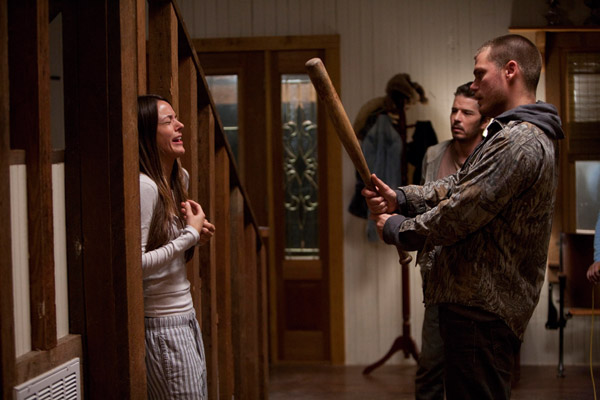If, like me, you thought the British Board of Film Classification was staffed by red pen-wielding fuddy-duddies, think again. At the entrance to its office in Soho Square, I’m greeted by its youthful, engaging press officer. Wearing what I think young people call ‘killer heels’, and treating me to an anecdote about how she copes with the ‘boring’ Euro 2012 football by drinking lots of wine, she couldn’t be less like Mary Whitehouse if she tried.
She introduces me to David Austin, head of policy. He’s not even wearing a collar and tie, never mind a censuring grimace. Within 20 minutes of my meeting him he has used the c-word more times than I have in 2012 so far (in the context of discussing its use in movies, of course), and has described to me a sexual activity I’d never heard of. He sees it a lot in the hardcore porn he classifies. It’s called the ‘bukkake’. Whatever you do, DO NOT GOOGLE IT.
‘The Ferman attitude has no place in the 21st century,’ he says. He’s referring to the late James Ferman, director of the BBFC from 1975 to 1999. Ferman was, as he himself admitted in the mid-1990s, ‘the last of the old-fashioned regulators’, the last of those 20th-century moral gatekeepers who believed they had the right to tell us what we could watch.
Austin says that where the likes of Ferman tried to shape public morality, the new no-collar-and-tie BBFC seeks only to ‘reflect it’. ‘We want to reflect what the public feels, not tell it what to think.’ So the BBFC no longer writes its guidelines for classifying films ‘behind closed doors’, but rather holds focus groups to find out what Joe Public thinks is acceptable in a 12-rated movie, a 15-rated movie, and so on. There have been focus-group chats on everything from the c-word to penises, and each time the BBFC updates its guidelines accordingly, making them, in Austin’s view, a democratic mandate for film classification.
The BBFC, which celebrates its 100th birthday this year, has undergone many changes. It started as a voluntary initiative by the film industry itself, before winning statutory powers in the 1980s to classify, and if necessary censor, cinematic and video releases. But it is its post-Ferman ‘liberalisation’ that has wrought the biggest changes. The BBFC now passes uncut even sexually explicit films such as Michael Winterbottom’s 9 Songs (2004).
Yet at the same time, it still behaves censoriously. It recently told Ken Loach to remove eight of the 15 c-words from his new film The Angels’ Share if he wanted a 15 certificate. It demanded 17 cuts from the 2010 horror film I Spit on Your Grave on the basis that some scenes were ‘sexually violent’ and might ‘harm’ viewers. Its more liberal attitude coupled with its continuing censoriousness puts it in a difficult position. ‘What does it take for a film to get banned these days?’ railed the Daily Mail in 2009, when the BBFC passed Lars von Trier’s sexy/gory Antichrist, while others, like me, ask who the hell the BBFC thinks it is making any cuts at all.
I challenge Austin over the elitist idea that still underpins the BBFC: that its staff are capable of watching every film under the sun without being ‘harmed’, whereas the rest of us aren’t and thus must occasionally have our eyes covered by these sages of Soho Square. I’m taken aback by his answer: ‘We can be harmed, too.’ He tells me BBFC staff have access to a psychological counsellor. He agrees that the BBFC — ‘just 50 people in these offices’ — doesn’t have the right to determine what is morally right or wrong, which is why ‘we hold focus groups’.
One gets a powerful feeling that the BBFC, like every other traditional institution, really is unanchored today, incapable of making meaningful moral judgments. But this can make it more censorious, not less. Austin tells me that many production companies now submit early drafts of their scripts to the BBFC, even before filming has started, with a note saying, ‘We’d like this to be a 15. Is it okay?’ I am given a rare glimpse into how the BBFC responded to one such request — and I’m shocked. The scriptwriters are advised to make a character’s skirt longer, remove an offensive punchline, make a masturbation scene ‘less vigorous’.
This is censorship, right? Austin shakes his head. ‘It’s advice.’ Hmm. It seems to me that, bereft of an overarching, Ferman-style moral code, the BBFC has become obsessed with policing the minutiae of movies instead. Once, we had the tyranny of the BBFC’s sweeping moralism towards films; now we have the tyranny of its pseudo-democratic picking apart of every word uttered and boob flashed, in the name of the focus group rather than God or public decency.







Comments